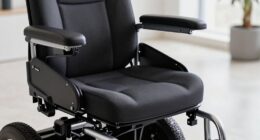Lewy Body Dementia can deteriorate suddenly due to factors such as infections, medication changes, hospitalizations, dehydration, and stress. These elements can result in a rapid decline in both cognitive and physical functions. Infections can accelerate the progression of the disease by impacting the immune system and brain health. Specific medications and sudden changes in behavior also contribute to exacerbating symptoms. It is crucial to promptly address these triggers with timely medical intervention. Caregivers should stay vigilant for any changes and seek medical guidance as necessary. Proper management and support are essential in dealing with this condition. Understanding these factors is vital for effectively handling Lewy Body Dementia.
Key Takeaways
- Infections and medication changes can trigger sudden deterioration.
- Stressful situations and routine changes can worsen symptoms quickly.
- Timely medical intervention is crucial to address sudden declines.
- Fluctuations in symptoms require proactive adjustments and consistent routines.
- Neglecting symptoms or delays in treatment can lead to rapid cognitive decline.
Triggers of Sudden Deterioration in LBD
Experiencing infections, changes in medication, hospitalizations, dehydration, and emotional stressors can trigger sudden deterioration in individuals with Lewy Body Dementia.
Infections, like urinary tract infections or pneumonia, can swiftly worsen symptoms in those with LBD. Similarly, alterations in medication, especially antipsychotics or sedatives, may lead to rapid cognitive and motor decline.
Hospitalizations, whether for surgery or acute illnesses, can exacerbate symptoms and cause sudden deterioration in LBD patients. Dehydration, a common issue in seniors, can further worsen confusion and cognitive abilities in individuals with Lewy Body Dementia, resulting in sudden changes in their condition.
Additionally, emotional or environmental stressors, such as moving to a new place or changes in routine, can also trigger abrupt declines in those with LBD.
It's important to monitor these factors closely and provide appropriate care to minimize the risk of sudden deterioration in individuals with Lewy Body Dementia.
Impact of Infections on LBD Progression

Infections can accelerate the advancement of Lewy body dementia, impacting the immune system's response and leading to a decline in neurological function.
Understanding this connection is essential in managing the disease effectively and providing appropriate care.
Infections Accelerate LBD
Accelerating the progression of Lewy Body Dementia (LBD), infections can trigger sudden and severe deterioration in cognitive functions. Common infections such as pneumonia can worsen cognitive decline in individuals with LBD, increasing the risk of delirium and rapid cognitive deterioration.
Addressing infections promptly is important in managing and potentially slowing down the worsening of LBD symptoms. The impact of infections on LBD progression underscores the importance of proactive medical care and infection prevention strategies.
Immune Response Impact
Our understanding of Lewy Body Dementia progression deepens when considering the impact of the immune response triggered by infections on cognitive functions.
Infections can lead to an overactive immune response in individuals with LBD, causing inflammation in the brain. This inflammation can accelerate cognitive decline, making symptoms worsen suddenly.
Additionally, infections can increase vulnerability in those with LBD, exacerbating neuroinflammation and neurodegeneration. The delicate balance of brain chemicals essential for cognitive and motor functions can also be disrupted by infections.
Prompt treatment of infections is essential in managing LBD to prevent rapid deterioration of symptoms. By addressing infections promptly, we can help mitigate the impact on cognitive functions and overall quality of life for individuals with Lewy Body Dementia.
Neurological Decline Connection
Understanding the impact of infections on Lewy Body Dementia progression reveals a critical connection to neurological decline.
Infections can trigger sudden worsening of symptoms, accelerating the decline in cognitive and physical abilities. Individuals with LBD are more vulnerable to infections, which can exacerbate brain changes and lead to rapid deterioration.
Infections like pneumonia or urinary tract infections significantly impact the progression of LBD, increasing the risk of sudden declines in health. Recognizing this connection is crucial for managing and addressing the sudden worsening of symptoms in individuals with Lewy Body Dementia.
Role of Medication Changes in LBD Decline

Medication changes, including opioids, anti-anxiety pills, and statins, play a significant role in contributing to sudden cognitive decline in individuals with Lewy body dementia. When managing medication for someone with Lewy body dementia, it's critical to be mindful of the potential impact these changes can have on their cognitive function.
Here are some key points to keep in mind:
- Specific Medications: Certain drugs like opioids and anti-anxiety medications can directly affect brain function in individuals with Lewy body dementia, potentially leading to a rapid deterioration in cognitive abilities.
- Exacerbating Symptoms: Alterations in medication regimens may worsen cognitive impairments and exacerbate existing symptoms of Lewy body dementia, causing a sudden decline in overall mental capabilities.
- Monitoring Importance: Keeping a close eye on medication usage is essential in preventing sudden cognitive decline in individuals with Lewy body dementia. Regular monitoring by healthcare professionals can help avoid unintended consequences.
- Management Strategies: Proper management of medication changes is key to maintaining cognitive stability in individuals with Lewy body dementia. This includes careful oversight and adjustments as needed to support brain function and overall well-being.
Recognizing Behavioral Changes in LBD

When observing a loved one with Lewy Body Dementia, it's important to pay attention to sudden mood swings, agitation, and aggression as they could indicate changes in the disease.
Hallucinations and delusions, especially visual ones, might become more frequent and intense, impacting daily life greatly.
Recognizing these behavioral changes early can help in managing and providing appropriate care for individuals with LBD.
Sudden Mood Swings
During the progression of Lewy Body Dementia, sudden mood swings manifest as rapid changes in emotions and behavior. When dealing with mood swings in LBD, caregivers should be aware of the following:
- Crucial Rollercoaster: Individuals may experience intense shifts in emotions, such as going from calm to tearful in a short period.
- Behavioral Variability: Actions can change suddenly, leading to confusion about what triggers certain behaviors.
- Increased Agitation: Agitation levels may rise unexpectedly, making the individual more restless or irritable.
- Supportive Interventions: Caregivers play a critical role in providing comfort and reassurance during these mood swings.
Recognizing these signs early on can help caregivers respond effectively and provide the necessary care for individuals with Lewy Body Dementia.
Agitation and Aggression
Recognizing behavioral changes in Lewy Body Dementia, agitation and aggression are frequently observed as common manifestations. In individuals with LBD, these behaviors can present as sudden outbursts, irritability, or restlessness.
Agitation may arise from factors such as confusion, frustration, or sensory overload in LBD patients. Identifying triggers for agitation and aggression is essential for effective management of these symptoms. Caregivers play a vital role in this process by employing calming techniques and establishing a structured environment to help reduce agitation in individuals with LBD.
Hallucinations and Delusions
Hallucinations and delusions, common behavioral changes in Lewy body dementia (LBD), often present as visual perceptions of people, animals, or objects that aren't actually there. When dealing with these symptoms, it's important to recognize the following:
- Visual hallucinations can involve seeing people, animals, or objects that aren't present.
- Delusions in LBD may include false beliefs or suspicions causing distress.
- These behavioral changes can fluctuate in intensity and frequency.
- Addressing hallucinations and delusions is essential for managing the symptoms of LBD effectively.
Understanding and responding to these challenges can greatly improve the quality of life for individuals with Lewy body dementia. By fostering a supportive environment and addressing symptoms proactively, caregivers can help manage some of the disease’s more difficult aspects. Furthermore, adopting healthy habits early on may potentially prevent dementia with lifestyle tips such as regular physical activity, a balanced diet, and mental stimulation. While these strategies cannot guarantee prevention, they can contribute to overall brain health and may slow cognitive decline.
Stress and Sudden Worsening of LBD

Experiencing heightened stress levels can trigger a sudden worsening of Lewy body dementia symptoms, impacting both cognitive function and behavior. Individuals with LBD may notice more pronounced cognitive fluctuations and behavioral changes during times of stress. It's essential for caregivers to understand how stress can exacerbate LBD and take proactive steps to manage it effectively. Implementing stress management techniques like relaxation exercises and mindfulness practices can help mitigate the sudden worsening of LBD symptoms.
Creating a calm and supportive environment is essential for individuals with Lewy body dementia. Caregivers play a key role in ensuring that stress levels are minimized to prevent sudden declines in cognitive abilities and behavior. By recognizing the impact of stress on LBD progression, caregivers can provide optimum care and support for those affected by the condition. It's important to address stress promptly and create a peaceful atmosphere for individuals with Lewy body dementia to thrive.
Importance of Timely Medical Intervention

Timely medical intervention is key when dealing with sudden declines in Lewy Body Dementia symptoms.
If you notice abrupt changes in memory, movement, or behavior, seeking immediate medical attention is vital.
Quick evaluation can help identify triggers like infections or medications that may worsen LBD symptoms suddenly.
Early Diagnosis Saves
Recognizing the signs of Lewy Body Dementia early and seeking timely medical intervention can greatly impact the progression of the disease. Here are some key points to understand the importance of early diagnosis and prompt management:
- Early diagnosis allows doctors to implement timely interventions to address symptoms effectively.
- Timely medical evaluation can help identify underlying factors contributing to sudden deterioration.
- Prompt management strategies can improve the quality of life for individuals with Lewy Body Dementia.
- Immediate attention is vital to address any sudden changes in cognitive, motor, or behavioral symptoms.
Treatment Delays Worsen
To prevent worsening of symptoms in individuals with Lewy body dementia, timely medical intervention is essential. Treatment delays can lead to sudden worsening of cognitive decline and increase the risk of complications.
When changes in behavior, cognition, or motor function occur, it's essential to seek immediate evaluation by healthcare professionals. Early diagnosis plays a key role in managing symptoms effectively and enhancing the quality of life for those with Lewy body dementia.
Prompt treatment is important to prevent rapid deterioration in individuals with LBD. As such, it's important to address any concerns promptly and work closely with healthcare providers to make sure timely care and support for those affected by Lewy body dementia.
Timely Care Crucial
Seeking immediate medical attention is vital in addressing sudden worsening of symptoms and preventing complications in individuals with Lewy body dementia. When caring for someone with this condition, it's important to be aware of the following:
- Delirium, often triggered by infections or medications, can cause sudden confusion in individuals with Lewy body dementia.
- Changes in routine, such as moving or new caregivers, can contribute to the sudden deterioration of symptoms.
- Caregivers should be vigilant for abrupt changes in cognitive and physical abilities in those with Lewy body dementia.
- Timely medical intervention plays a significant role in managing and stabilizing sudden worsening of symptoms.
Managing Fluctuations in LBD Symptoms

Addressing fluctuations in Lewy Body Dementia (LBD) symptoms requires careful monitoring and proactive adjustment of treatment strategies. Fluctuations in LBD symptoms can cause sudden changes in cognitive abilities, behaviors, visual hallucinations, delusions, and motor function.
Individuals with LBD may experience variations in attention, alertness, and confusion levels. To manage these fluctuations, it's important to adjust medications as needed, establish a consistent daily routine, and create a calm environment.
Caregivers play an essential role in observing for sudden changes in symptoms and promptly seeking medical advice when fluctuations worsen. By staying attentive and responsive to these variations, caregivers can help individuals with LBD navigate through challenging moments effectively.
Understanding Cognitive Declines in LBD

Cognitive declines in Lewy Body Dementia (LBD) can rapidly worsen, impacting various aspects of daily functioning and leading to sudden changes in memory, problem-solving skills, and executive functions. Here are some key points to help us understand the cognitive challenges in LBD:
- Attention Fluctuations: Individuals with LBD may experience sudden fluctuations in attention, making it difficult to stay focused on tasks or conversations.
- Memory Changes: Rapid changes in memory can occur, affecting the ability to recall recent events or information.
- Motor Function: Changes in motor function, such as tremors or gait disturbances, can contribute to the sudden progression of cognitive decline in LBD.
- Visual Hallucinations: Visual hallucinations and perceptual disturbances may intensify suddenly, leading to heightened cognitive challenges and confusion.
Understanding these aspects of cognitive decline in LBD can help caregivers provide better support and care for individuals affected by this condition.
Support Systems for LBD Caregivers

In caring for individuals with Lewy body dementia, we rely on a network of support systems to alleviate the emotional and physical strains experienced by caregivers. These support systems can include various resources such as respite care services, which offer temporary relief to caregivers by providing assistance in the responsibilities of caregiving.
Education programs and training sessions play an important role in helping caregivers better understand and manage the unique challenges associated with Lewy body dementia, equipping them with the necessary skills and knowledge to provide excellent care. Online support groups and local community resources are also valuable, offering information, guidance, and connections to caregivers of individuals with LBD.
Furthermore, counseling services and caregiver support networks are essential in providing emotional support, coping strategies, and a sense of community for those facing the challenges of caring for someone with Lewy body dementia. These support systems are essential in ensuring that caregivers have the necessary tools and assistance to navigate the complexities of caring for individuals with LBD.
Coping Strategies for Sudden LBD Deterioration

As caregivers navigating the challenges of Lewy Body Dementia, understanding effective coping strategies for sudden deterioration in LBD symptoms is vital in ensuring the well-being of individuals under our care. Here are some strategies to help navigate through sudden worsening of symptoms in Lewy Body Dementia:
- Stay Vigilant: Be attentive to abrupt changes in symptoms like increased confusion, hallucinations, or mobility issues, as these could indicate a sudden deterioration in the individual's condition.
- Maintain Consistency: Keeping a consistent routine and environment can provide stability and comfort, potentially helping to mitigate sudden declines in cognitive functions.
- Seek Immediate Medical Attention: If you notice unexpected declines in cognitive or physical functions, it's essential to seek prompt medical evaluation to address any acute issues that may be contributing to the sudden deterioration.
- Address Underlying Medical Concerns: Addressing any underlying medical problems promptly can play a significant role in preventing or alleviating sudden worsening of LBD symptoms.
Frequently Asked Questions
What Are the Signs That Lewy Body Dementia Is Getting Worse?
When signs of Lewy Body Dementia worsening appear, we notice increased visual hallucinations, confusion, motor function changes, behavioral shifts like aggression, and sleep disturbances. These indicators signal a rapid decline in the condition.
Can Lewy Body Dementia Come on Suddenly?
Yes, Lewy body dementia can come on suddenly. Changes in routine, infections, or medication adjustments may trigger rapid deterioration. Caregivers should stay alert for sudden shifts and promptly consult medical professionals for guidance on managing these changes.
How Fast Can Lewy Body Dementia Progress?
Lewy body dementia progression can vary, with symptoms worsening over weeks to months. Sudden changes in cognition, movement, and behavior are common. Fluctuations in symptoms occur, making the rate of decline unpredictable.
What Is Terminal Lucidity in Lewy Body Dementia?
Terminal lucidity in Lewy body dementia refers to brief episodes of improved mental clarity and memory before death. This phenomenon, not fully understood, can offer comfort by fostering moments of recognition and connection with loved ones.
Conclusion
In summary, sudden deterioration of Lewy body dementia can be triggered by various factors such as infections, medication changes, and stress. It's important for caregivers to be vigilant for behavioral and cognitive changes, and to seek support when needed. Managing fluctuations in symptoms and understanding cognitive declines are essential in providing care for individuals with LBD.
Remember, staying informed and proactive can help navigate the challenges of this complex condition.
How can we better support those affected by LBD in our communities?









